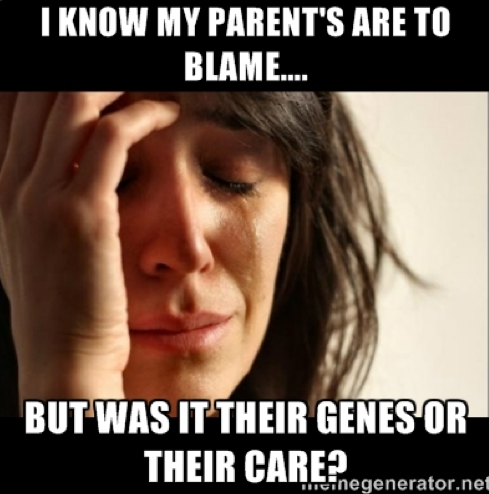Who are we? The search for meaning, in our own lives, in our possibilities, and yes, in where to place blame, drive our curiosity– they are themselves part of what makes us human– a species with the ability to question our own existence and to search for a truth that explains us.
An often discussed point, in literature and in our lives, is whether our traits derive from nature or nurture. Stories of identical twins, particularly those who were separated at birth dominate, because they provide an interesting data point, but it is essential our search for what makes us- us, what makes us unique, that drives this.
A classic example of this is demonstrated in this meme- when things go wrong, our instinct (or at least mine) lets us look for something to blame- some external cause, another person. When we in turn begin to recognize that it could be –gasp— our own selves, the questioning begins- how did we get this way. Perhaps this question is another step on a search to find someone, something, some circumstance to blame, and the meme certainly presents it as such.
Likewise, any definite answer will lead to a change in our system- if we know that answers are buried in our genes, it leaves open the possibility that in some not-so distant future, we’ll be able to not only choose the hair color our children have, but potentially there level of intelligence, their personality- all of it could, in this extreme case be determined by the genome. On the other extreme, a world where parenting is the only thing that’s important would lead to (expensive) high powered preschools, were every moment in a child’s life is controlled and regulated, in order to produce the best-suited children, in a Lamarckian fashion- change within one life time, always striving to be better.
So who is to blame? The parents we grew up with? The genes, our own DNA, buried in our every cell? But we know this can’t be the whole story- identical twins aren’t exactly the same. Siblings share similar tendencies- lots of people tell me that my sister and I sound the same, laugh at the same things, share a pattern of speech- this is quite possibly true, but doesn’t answer the question- we share the same set of parents, and the same genes.
In my opinion, it’s a mix between the two, coupled with life experiences and individual choices, that make us who we are. A child whose parents weren’t perfect (whose are?) is not doomed, nor a child who has been lucky enough to have parents that love and care about them. While we may feel the need at times to blame our parents, whether for their genes or for their parenting style, we have to remember too that we are our own people- perhaps that is what should drive us and our choices.
No matter what makes us who we are- life is what we make of it. So remember to dream about the future, explore ideas about who you may be, and examine possibilities.



Hi Serena, I really enjoyed this post. You were very informative and detailed when it came to explaining the difference of nature vs. nurture. This was also very well represented in your meme. Your opinion is the same as mine; we are a bit of both (nature vs. nurture). Keep it up!
It was a good thing you put your meme on the top because its a good way to get your reader thinking before reading the post. The way you use questions throughout the post is a good way to keep the reader engaged and curious, questioning and more enthusiastic to learn.
I think we are both who we made ourselves to be, our genes, and the environment we grew up in. This post was very informative and insightful.
I agree Serena, I think there is some middle ground between nature and nurture. This reminds me of a video we watched in Bioethics class. It was about a doctor named Dr. Money (I’m not making that name up) who changed the sex of an infant boy, who had a mishap during a circumcision, into a girl. He told the parents that if they nurtured him as a girl, he would think he was a she. The theory was very flawed and the boy went back to being a boy when he was older.